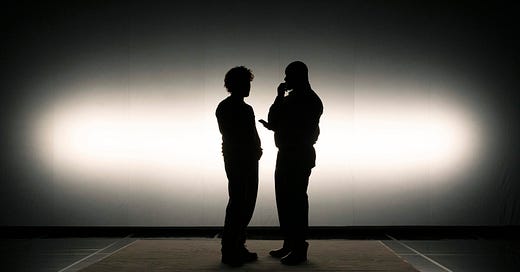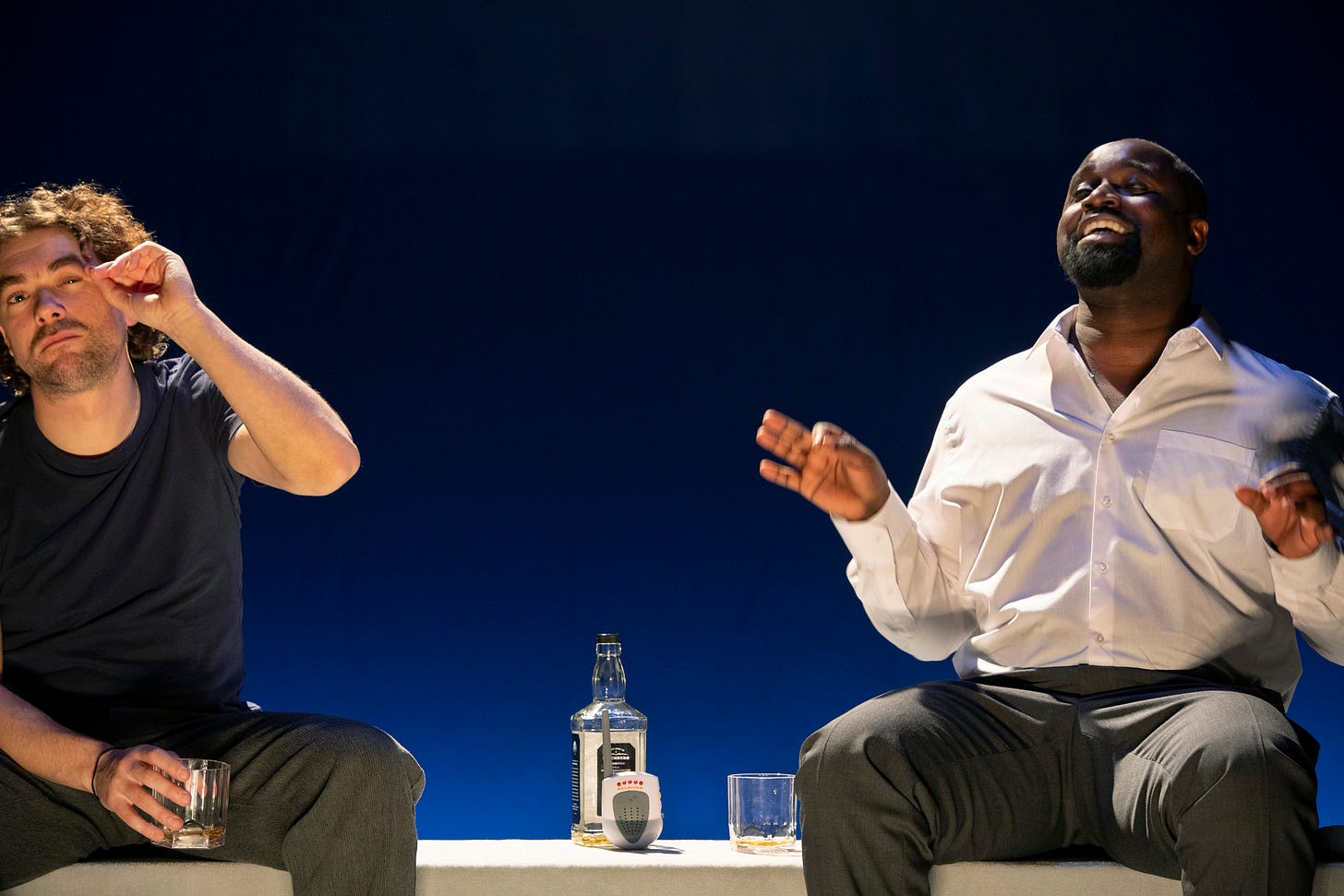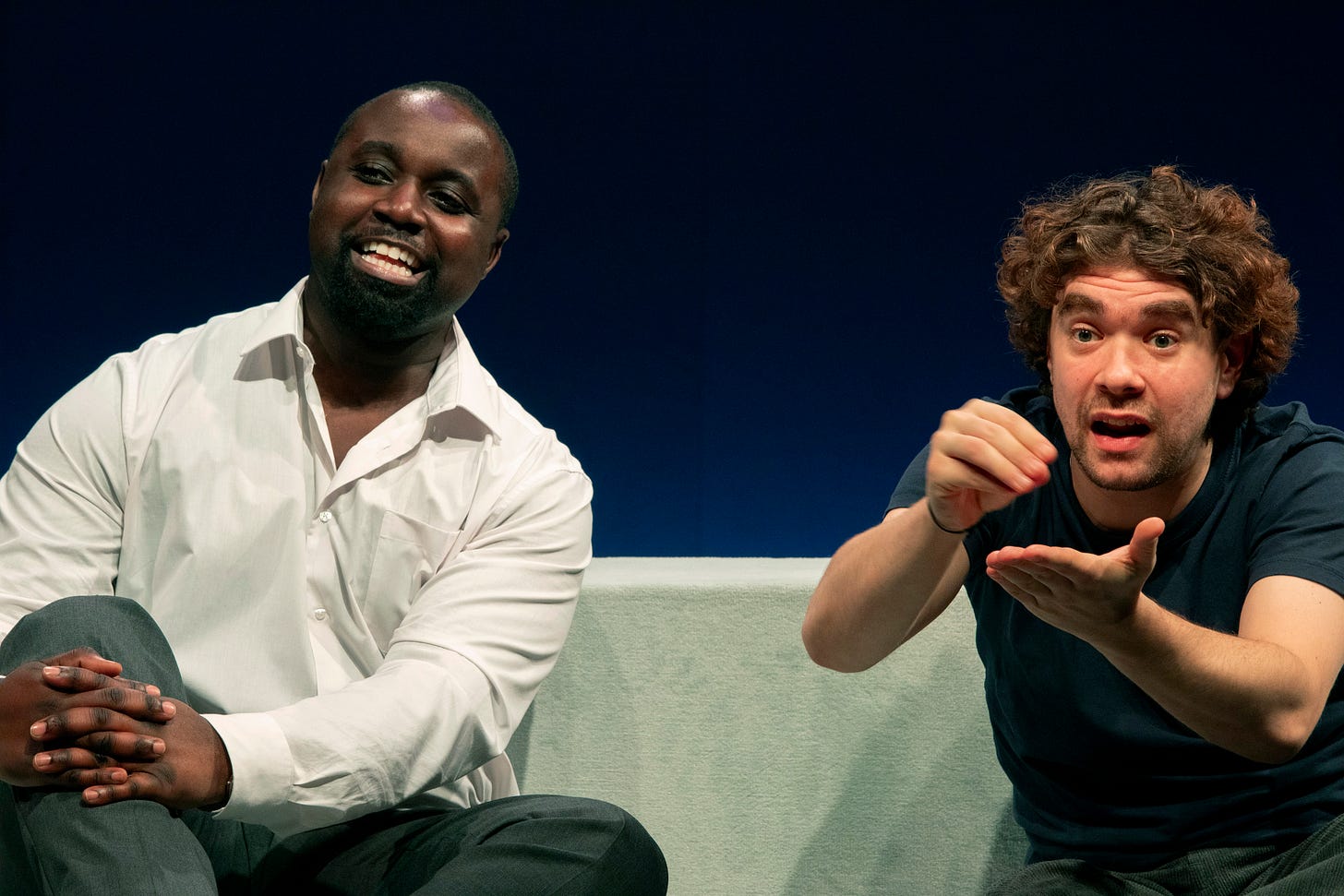Review: A Case for the Existence of God
Samuel Hunter's subtle meditation on Grace
Picture: Sanne Peper
Last week, the Dutch production of Samuel D. Hunter’s play A Case for the Existence of God premiered in the Netherlands. The play, under the direction of Erik Whien, has been very well translated by Vera Morina and Whien. The scenography is sober but effective, and the two actors, Emmanuel Ohene Boafo and Bram Suijker are magnificent. Despite many interpretations to the contrary, I will argue in this blog that this play is not simply a philosophical play but a subtle sermon about grace in a secular culture.
Samuel D. Hunter works and lives in New York but originally hails from a small town in Idaho. He perceives a deep division in his country between the few for whom the American Dream is working and many people for whom the dream is not working but who do their best to make it work. In his earlier work, such as The Whale - now a primary movie production featuring Brendan Fraser as a reclusive, morbidly obese English teacher who attempts to reconnect with his estranged teenage daughter - there was not much room for optimism. Instead, most of his work so far tended to finish on a more pessimistic note.
To begin with, it is hard for us outside the United States to imagine how controversial the play's title was at the time of its initial staging in New York. Some who did not see the play found it a pretentious title or feared blasphemy. Others who went to see it argued that since God is not mentioned in the play, the title is a deliberate smokescreen to stop people from coming in with their usual prejudices and preconceptions. In Rotterdam, the visitors were given a small philosophical essay by Brecht de Backer, who went with the second line of interpretation. However, in an interview after the play, Hunter clearly stated that it is about God and finding hope and friendship in challenging circumstances.
Brian (Bram Suijker) and Kevin (Emmanuel Ohene Boafo) Picture: Sanne Peper
The storyline of A Case seems straightforward. Two dads, Brain and Kevin, meet each other at an important moment in their lives when things seem to be slowly derailing their hopes and dreams for their and their children's futures. Kevin is a single gay man who hopes to become a foster parent for a baby girl born to a drug-addicted mother. Brain has had a tough life, is currently working on a marginal job in a factory in town, and is going through a divorce. In the original version, the play is set in Twin Falls, Idaho, a place far removed from the lives of the highly successful people living on the East and West coasts of the United States. This makes A Case a play about how people who do not have access to well-paid jobs or mortgages struggle in the peripheries of society. It covers Brian and Kevin’s past, their present situation, and there is even a perspective on the positive impact of their friendship on the future lives of their children.
Watching the play, a deeper layer of interpretation dawned on me. An understanding that was far more religious than most critics have been willing to admit. This play is a meditation on unmerited goodness, the good things in life that happen to us over which we have no control. In other words, this play is a meditation on grace in the tradition of great Christian, Catholic, authors in the past, like Graham Greene and George Bernanos. In my opinion, A Case comes close to Bernanos’ intuition in his book Diary of a Country Priest, where the main character on his deathbed remarks, ‘In the end, all is grace.’
Picture: Sanne Peper
Listening to the interview after the play, I noticed how Samuel Hunter openly spoke about the religious ideas behind the play and how the person conducting the interview seemed embarrassed by this confession, constantly trying to steer the discussion away from the topic. There may be a fear that people will not like the play because of its religious undertone. However, the high quality of the work and the strong performances by the two actors make clear that this fear is unfounded.
Later, I had a chance to chat with the playwright about the religious undertones in his play. It turned out that Samuel grew up in a very strict religious environment. Now, he tries to convey the deeper value of Christianity in other ways in a largely secularised and polarised culture. Today, his church is the theatre. This resonated with me while watching the play. I think that the play argues convincingly that the grace we find in our ordinary lives - the unexpected goodness, the friendships, the fact that someone needs us - is proof of the existence of God.
In conclusion, A Case for the Existence of God is one the subtlest and yet convincing sermons I ever heard about grace. As a preacher, I most profoundly respect a play that explores grace in ordinary people's lives and tells this hopeful story to new audiences worldwide.
Teaching the kids. Picture: Sanne Peper
I saw the play on the 4th of January 2024th at the Theater Rotterdam.







